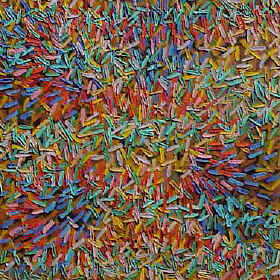| EXPERIMENTING
WITH TIME IN PAINTINGS
The time that a person spends listening to a particular
piece of music is an experience of the sound being impinged on the auditory senses of the
listener by the composer. I will call this sensation IMPINGED TIME. The listener may
contemplate the music afterwards on his own time.
A spectator may view a painting without experiencing a
sensation of impingement. A simple statement or extended analysis as to content or style
is a secondary intellectual response. Some common expressions such as
"pulsates," "feel the heartbeat," or "has presence" in
referring to a Rembrandt figure are in the realm of IMPINGED TIME.
THREE APPROACHES TO IMPINGED TIME
 |
|
PERPENDICULAR TIME is the experience of sensing a
"flipover" in an optical illusion. Perpendicular because it is not necessary for
the eye to move during this phenomenon. The eye is merely a channel through which the mind
responds. In the reversible box (Necker Cube) the intersecting lines at points A and B are
indistinguishable to the eye as to whether the horizontal or the vertical is in front of
the other, and the decision is left to subconscious activity. Conscious effort may effect
a change as well. |
|
HORIZONTAL TIME—Forms having weight or suggesting a
direction or thrust will become impinged time through the momentum of anticipation by the
spectator. |
|
OPTICAL TIME—When the optical apparatus of
the spectator is stimulated by the interaction of lines, by textures or by the
belligerency of contrasting colors. |
|
|
|
Fourth Dimension for a Two
Dimensional Surface
ON PERPENDICULAR TIME
A static image can elicit a sensation of change. Time is implicit in change.
INTENT
To engage and expand that area of consciousness
(pre-conceptual) where free-flowing sensations attract and are in the process of being
converted into, memory patterns.
DEFINITIONS OF TIME
Static Time – Its opposite poles (past and future)
being equally infinite exist simultaneously as a static whole.
Subjective Time – The process of constituting a
multiplicity of quantitative and qualitative "beginnings" and "ends"
by a particular consciousness.
Pre-Conceptual Time – The duration which occurs
between states of knowing.
DEFINITIONS OF FIGURES
Static Time Symbol – Its opposite poles being two
distinct instances of subjective time, exist simultaneously as a static whole. (A
Reversible)
Subjective Time Figure – A particular instance of
subjective time. (Memory Pattern)
Pre-Conceptual Time Field – "Sensation" in
a state of nascency.

The Pre-conceptual Time Field is that fraction of an instant that the observer experiences
as Impinged Time during the flip-over
DEVELOPMENT
The numerous forms which represent the "subjective
time figures" should be developed toward a nascent state, reduced in mass while
retaining their tensile energies, in order to frustrate the locking-on or gap-closing of
the cognitive process, thereby expanding the pre-conceptual time field. The total physical
content of the painting equals the static time symbol when all of its forces are in
equilibrium and become activated according to the optical and psychical changes occurring
in a particular consciousness (Observer).
Phillip Schreibman
September 2, 1966
---------------------------------------------------------------------------------------

"NUMBER ONE" 1972
STUDY FOR MOTION AND CHANGE AS TIME
Click To Enlarge Painting
| HOME
| THE SYNESTHESIA CONNECTION|
| EXPERIMENTING WITH TIME IN
PAINTINGS |
| THE VIRTUAL GALLERY , ABOUT THE ARTIST AND
MUSEUM / UNIVERSITY EXHIBIT INFORMATION |
| INFORMATION FOR THE COLOR OF
MUSIC,
THE BOOK AND PAINTING MUSIC, THE VIDEO |
Copyright © 1999 - 2010
[PaintingMusic.com / PHILLIP SCHREIBMAN].
All rights reserved.
Revised:
January 13, 2010.
|


